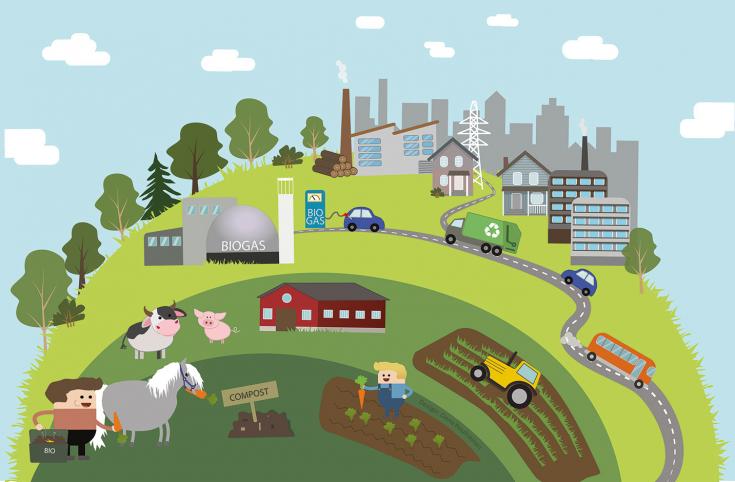Circular economy starts from the regions

This week is all about environment and resource efficiency. Today we’ll have a look at how regions work together to develop locally based cooperation models for bio-based circular economy.
Circular economy implies a mindset change; moving away from single-use and disposal towards reusing and recycling material and products. Focusing especially on making use of bio-based resources in this context, the BIOREGIO project helps regions share solutions and knowledge about sustainable technologies and cooperation models.
The participating regions from six different countries explore how to make use of resources like food waste, agricultural residues, or other bio-waste. Beyond single actions, they also look at how to connect actions and initiatives to build circular cooperation at the regional level.
Check this interview with Susanna Vanhamäki from Lahti University of Applied Sciences (Finland), the lead partner of BIOREGIO, to get an idea of how this works in practice:
What have they achieved?
In Slovakia, plans or strategies towards circular economy were not laid out in any documents at the regional or national level when the BIOREGIO project started in 2017. The Slovak University of Agriculture and the Nitra self-governing region joined the project. Thanks to the experiences and ideas shared in BIOREGIO, bio-based circular economy has been included in the economic and social development programme for the Nitra region. Funding has been allocated for instance to initiatives improving waste sorting, recycling, composting and awareness-raising activities in the municipalities in the region.
To know more, see this interview with Eleonora Marisova from the Slovak University of Agriculture in Nitra (Slovakia) below or read more the results achieved in Nitra here.
In Finland, BIOREGIO influenced the Finnish sustainable growth and jobs programme. Thanks to BIOREGIO, the bio-based aspect is strongly emphasised in the updated circular economy roadmap. Good practices and site visits to other regions - pyrolysis of MSW in Toledo, Spain, and BIO2ECO producing bioenergy on-site in Greece - were picked up in project Kiertoliike, which promotes circular economy on the regional level. The inspiration from BIOREGIO helped in shaping local actions on biowaste collection and the development of bioenergy solution in the Päijät-Häme region.
How?
How was it all done? Through sharing good practices and knowledge. The partners visited each other to see the best solutions in action, discussed policies in seminars and events, worked with experts to summarise key lessons in policy briefs and expert papers, and worked closely together with the local actors in their own regions to put the best ideas into practice at home.
In Slovakia, the partners were inspired by the circular economy roadmap of Päijät-Häme (Finland) and updated the economic and social development programme in the Nitra Self-governing region to include activities on bio-based circular economy.
In Finland, BIOREGIO has helped to promote the circular economy roadmap of Päijät-Häme nationally as well as internationally. The roadmap is a part of the regional strategy. It was drafted in the Kiertoliike project, but thanks to the close cooperation between the two projects, the bio-based aspects were prominently integrated in the roadmap.
Keen to know more?
Good practices from BIOREGIO have also been featured in:
- A
: ‘Sustainable management of bio-waste: Regional cooperation for improved bio-waste management’Document
- A
: ‘Putting theory into practice: Circular economy business models in the EU’Document
- A policy learning workshop: Opportunities for the uptake of industrial symbiosis in European regions
More results
Have a look at our results page for more examples of fruits of cooperation.
See also what other projects working on environment and resource efficiency have achieved, including:
